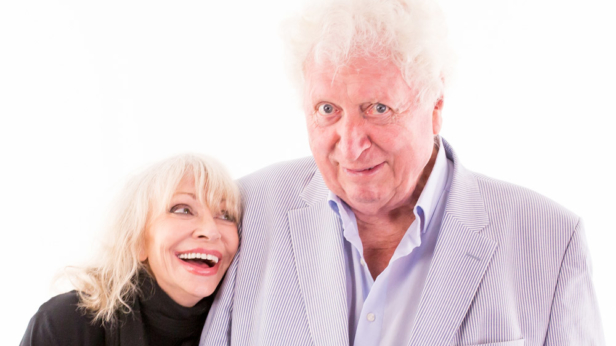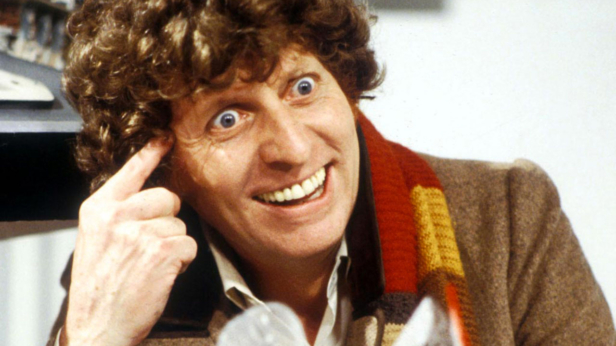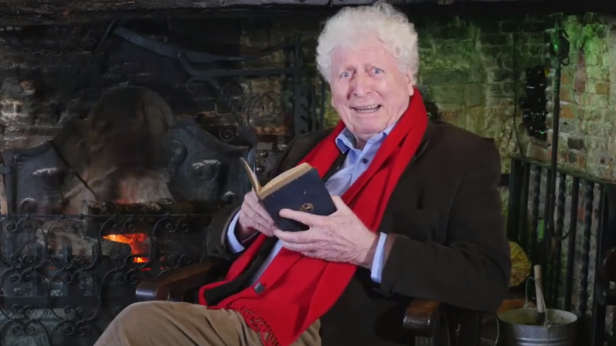Back in February 2017, SciFiNow spoke to living legend Tom Baker about his incredible career, his work with Big Finish Productions and being a children’s hero.
SciFiNow: You came back to play the Doctor for Big Finish in 2011. What was it that finally convinced you to reprise the role?
Tom Baker: We were at [Doctor Who star] Nick Courtney’s memorial service and the boys from Big Finish – who are so loyal to everything to do with Doctor Who – all happened to be there. They made it clear that they would like me to do some work for them, and because they were just so nice – and later they’ve become really warm friends to me – I decided to have a meeting with them. They came to my house – and we laughed and had some tea round my kitchen table – and persuaded me. I checked their output, which of course is staggering, isn’t it? Absolutely amazing. So that’s how it happened.
The thing is, of course, everything after Doctor Who was really a bit of a disappointment. It was the biggest and best thing I ever did, I think. I really did so love being Doctor Who and they tolerated me – well, I think they always tolerate the actor who’s got the part, influencing it. I couldn’t reel off exactly the things I’ve done since then…I worked with Jim Moir, playing a ghost, in Randall and Hopkirk Deceased. That was right up my street because I got on so well with the boys [Reeves (né Moir) and Mortimer, who headlined the show]. That pleased me a lot. I was a bit laborious, I think, in Monarch of the Glen. I sometimes felt we couldn’t match the scenery… which was wonderful, wasn’t it?
Anyway, finally I got with the boys [from Big Finish] and my happiness has never been more complete. I’m getting old now and I do get invited to do jobs still, but I’ve never been so happy as I have in the last five or six years since I’ve been with them. They are just so wonderful. They hire such wonderful actors which thrills me a lot. We all get on and they provide lovely lunches. It’s usually a two-day ‘shoot’. It’s marvellous to turn up and find Julia Mackenzie there, or David Warner, for example.
I don’t know how many I’ve done, an enormous number. Of course, I’m well ahead now, because I’m so old. Some of the stuff I’m doing now won’t be issued – you’ll know the post production is very refined, they don’t rush anything – some of the stuff I’m doing now won’t come out until 2021 or something. Afterwards I always do a little interview, so some of that stuff may actually be me talking from beyond the grave, which makes me giggle a bit. It makes me shiver a bit, too, but it makes me giggle more.
How does it feel playing the Doctor again? Had the part stayed with you?
Oh yes it did. You know, I don’t want to be fanciful about my acting at all – I have no right to be – but Doctor Who thrilled me so much because it was the character so near to me. So near to me in the sense that everything about him was so utterly improbable. It’s about dreams. Of course, technically, we know that people can’t go backwards and forwards in time physically, but of course we can go backwards and forwards in time in our memories. When we think about childhood we’re going backwards and when we’re filled with hope we’re going forwards. Like my religious upbringing which was so strict and so full of improbabilities, you know, angels on my shoulder, God being everywhere – which made me very very self-conscious in the bathroom! I remember one of the joys of coming home to my mother and saying ‘in Heaven [where I thought I was going], Father told us this morning that it’s got a glass floor’. The beauty of this is it’s got a glass floor and a wonderful sound system, so you can stand there up in Heaven looking down into Hell and see all the people and you can hear them screaming, waving their arms and crying. They’re all crying out the same thing, they’re crying ‘Lord! Lord, we didn’t know!’ and you’ll be able to shout down ‘No, but you know now!’. My dear, sweet mother was a bit appalled by this, by the pleasure I was taking in it at the age of about eight. All that influenced me later in my life, and still influences my conversation with you now! All that idea of confessing sins that I hadn’t really committed, and the sense of being forgiven, and angels and prayers all the time, and being superior. All that capacity to suspend my disbelief, my critical faculties, as a child – which is what actors do all the time – all came back to me. For a long time after I joined, the regular writers were still writing for Jon Pertwee. It was all written in the idiom of Jon’s – brittle and stylish, rather sarcastic and very very impressive. So I had to wrench it my way, and Barry [Letts, producer] and [script editor and writer] Terrance Dicks and the others went along with me quite quickly for the way I slanted on things, in other words they were writing rather silly, childlike scripts which I played with – I hope – tremendous sincerity. Then, of course, when it went out and I began to meet children in schools and things like that, and they would tell me what they liked, I would put that in the script if I could. It became less of a job than a way of life in which I was just ecstatically happy. Being a children’s hero was a wonderful wonderful existence.
Have you consciously emphasised or altered anything about the way you play the Doctor?
Well probably my voice has aged – I’m not aware of that because I don’t listen to it. I do know that on some of the seven or eight-line speeches I have to privately rehearse them very carefully so that I can get through them at high octane and with plenty of breath. The thing is that I get the scripts well in advance and I don’t want to sit down for hours at a time, I don’t think that’s the best way to do it. I sit down four or five times in a day for half an hour or forty or fifty minutes each and then I absorb it. So when I get to the studio all I need are the notes from Nick Briggs, or whoever’s directing me, asking me to go faster or slower but getting the sense over. When you’re talking this nonsensical stuff, as in life if you’re going to be impressive talking nonsense, you’ve got to work at it and concentrate.
You’ve reunited with Louise Jameson (as Leela) and Philip Hinchcliffe for the Philip Hinchcliffe Presents series for Big Finish…
Yes, that’s right. That’s because the boys are sharp enough to realise that the fans are very conservative. When I say conservative, that’s when they’re thinking about their favourite Doctor Who. They like to see how innovative the new Doctor Who is, but they are themselves very conservative because fans are rooted in nostalgia, aren’t they? The thing about nostalgia is that it transcends age and everything. If I see an old cricket player, I don’t think ‘he’s limping, he’s old’. The miracle of nostalgia – it’s an ache, from the Greek word – it’s a longing and you go back. You hear a name or a voice and you’re translated back to when you were young and happy and full of hope. That’s the power of nostalgia. I get wonderful letters from America, from people now in their fifties, really outrageously flattering and saying how they learned to read or got interested in science because of watching Doctor Who. It’s very gratifying. I can’t go to all the conventions I’m asked to do, but when I go to them the fans give me a terrific reception, queue up for ages and want to have their pictures taken with an old man. They must see it but they don’t react to me as if I’m an old man, they don’t raise their voices thinking ‘he’s deaf’ or look at each other and think ‘Christ, the years are hammering him!’. The years will hammer everybody.
Something you are working on with Bafflegab Productions is the Baker’s End series, written by Paul Magrs, in which you play a fictionalised version of yourself. How would you describe the series?
Well, I found it absolutely amazing. It was a very spooky feeling, actually, to have people calling me Tom. It was Paul Magrs take on, I suppose, a wacky, distorted version of the way I behave, or the way I talk or something like that. The other actors are very enthusiastic. I must say that I thought perhaps I overhit it, but then when I said this to my wife she kind of looked out of the window at the alpacas as if I might perhaps have been missing the irony of that! One of them I think was up for award. A few people have mentioned that they like it a lot…

You appeared in The Golden Voyage of Sinbad…
It was a marvellous part, and I struck up a lovely warm relationship with Ray Harryhausen, who was simply an adorable artist, and man of extraordinary ability and warmth. I saw something of his post-production work in Shepherd’s Bush where he had a studio, and because we remained friends I used to go down there and watch him at work sometimes. It did me a lot of good, that wonderful work he did, calling on the actors to get their imaginations going, of course, because none of the obstacles were there. I had a lot to do with creatures who weren’t there on my hand. I was supposed to be talking magic and what I did was I just talked gobbledegook Latin, from my monastery, and slurred it a bit and hoped that no-one noticed. Anyway, I didn’t hear from the Pope so obviously he didn’t see it. So those are the memories I have – and all the fun of being in Spain and having a beard and all that fabulous make-up. My great pal on that was Douglas Wilmer. He and I became inseparable for several years after that. He and I were very keen on Sherlock Holmes and of course he had been a marvellously brittle, manic Sherlock Holmes, so that interested me. So yes, everybody adored Ray Harryhausen. I don’t remember the producer very well, Charlie Schneer, I took no notice of him and he took no notice of me, so that was easy. Caroline Munro I meet regularly at little conventions – she is a marvellous promoter of that film and all the spinoffs, she’s been at it for years now. She’s still a beautiful girl.
I wasn’t strong enough to go to Ray Harryhausen’s memorial service where they would have expected me to speak but I sent my condolences. Now I find the idea of going to funerals, especially speaking at them, I find it very hard. I find it hard talking about Nick Courtney because we loved him so much. I’m terribly aware, like all old people are, of how quick it all is! There’s a formula I worked out on my computer of the average life-span being about a thousand months, which is 4000 weeks, which is 29000 days…
Oh god!
…2.5 billion heartbeats. I really must stop doing that…
More recently you did a voice for the Star Wars Rebels TV show.
Yes I did! The Bendu. I met Dave Filoni, the producer, and he wanted me to do a particular voice and I did it. I’d done the job within 35 minutes or something, and because it was raining outside and there was no-one coming into the studio next, we went over it again, you know – I was making him laugh, and when people find me funny it goes to my head. So I instantly got confident about the script that I’d just recorded and did it in another way for him. Then went mad and did a Baker’s End job on it! Dave was laughing and so was the recording person. Then he came back suddenly and asked me to do some more, I don’t know how many I’ve done because I did several pages. That roused a lot of interest on the internet, and it was fun to do. Of course it’s only a voice, I don’t get to meet any of the others. Which can’t be helped – I’m too far away, I can’t go to America anymore. Actually I’m doing a job soon via Skype! I think that’s absolutely terrific, isn’t it, to be able to do it in bed!
Have you thought of writing any more after your autobiography and The Boy Who Kicked Pigs?
I don’t think so. You know, the reason I wrote my autobiography was that my wife had bought me a word processor, and I had a lovely little studio where I kept books and things like that. Learning this word processor, I thought I’d better write something and started to write my memories to a friend of mine, a writer, and he said ‘you must get yourself an agent’ and I said ‘I don’t know how to do that’. He said ‘well I’ll do something for you’ and the next minute – well, an hour later – the phone went and Sheil Land were on the phone and the girl said ‘can I drop by and pick up what you’ve written?’ and so it went on from there. That was all just an accident of having a word processor! It’s rather like if my wife had given me a boomerang, I might have gone out and…well, I could have killed myself because they come back, don’t they?
When The Boy Who Kicked Pigs came up, that was just a little story that I enjoyed writing because I couldn’t write about a good boy, no-one wants to hear about good boys. It’s in six languages now. It amuses me on my bookshelf to see my book in Chinese, or Korean, I don’t know. The funny thing about that is a young company called Kill The Beast – these young companies have marvellous titles, Kill The Beast is wonderful – these young boys and girls actually adapted it for the stage and they took it to the Edinburgh Festival, where it was well-received. Afterwards they did a few weeks in Manchester, I think, and my wife was telling me the other day that they’re going to do it again, so every now and then a cheque comes in from that but I didn’t see it myself as I couldn’t get to Manchester. I don’t think of myself as a writer, really. It’s hard work.
Thank you so much for talking to me.
If there’s anything else, just make it up. I don’t mind!

